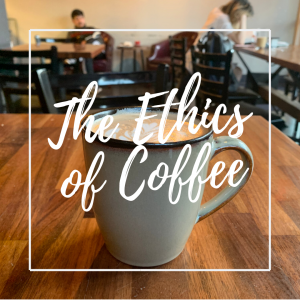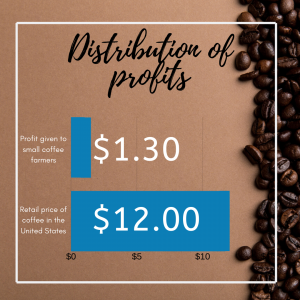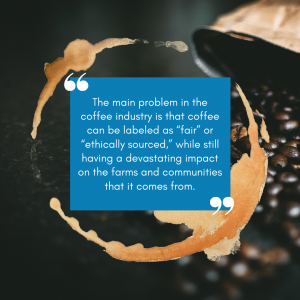Drinking an ethical cup of coffee
Fair trade standards are not what they seem
Fairtrade labels have completely lost meaning as corporate executives manipulate standards for their own monetary gain. As a result, the lack of ethical guidelines in the coffee industry allows small farmers to be exploited.
The main problem in the coffee industry is that coffee can be labeled as “fair” or “ethically sourced,” while still having a devastating impact on the farms and communities that it comes from.

Corporations sit by and collect checks as small coffee farmers are exploited.
In order for coffee to have a certified label, such as “Fairtrade certified” or “USDA organic,” farmers must adhere to environmental and labor standards set by certification groups— the biggest of which is Fairtrade International.
The problem is that these ethical standards change at the convenience of the corporations purchasing the coffee.
Fairtrade International has been wrapped in several scandals in recent years as they focus primarily on producing volume and have failed to address fundamental issues like ethical trade, child labor and child slavery, according to the Washington Post.

Profit distribution is grossly inequitable.
The New York Times defines the fair trade movement as the socially responsible food movement that seeks to lift farmers in the developing world out of poverty by offering them a premium for crops like coffee, cocoa and bananas.
This movement has gained significant commercial value as consumers gravitate toward products that are labeled as fair. The corporations profiting off of the fair trade movement do not care about how misleading the label has become.
As the movement gains value, farmers are taken advantage of in secret. Customers buy products under false pretenses as small coffee farmers do not see the profit they deserve for their products.
A fairtrade co-op is a farmer owned enterprise that guarantees them a minimum price for their products. For example, belonging to a “fair trade” co-op guarantees farmers a minimum price for their coffee, yet farmers only make $1.30 per pound of coffee that retails in the United States for $12 a pound, according to the New York Times.

Labeling coffee as “fair” or “ethically sourced” is misleading in this industry.
This leaves farmers in poverty by no fault of their own, a frequent occurrence in the cocoa and coffee industries, according to the New York Times.
According to the Fairtrade Foundation, 80 percent of the world’s coffee is produced by these small coffee farmers. Each farmer employs some workers.
According to The Guardian, Fairtrade International recently came under fire as their standards did not regulate the wages of workers if a farmer employed less than 20 workers. If they employed fewer than 20 workers, they weren’t required to pay their workers the legal minimum wage.
Because the farmers themselves are so poor, they cannot afford to pay their workers any more than is required by law. If they are not required to pay their workers anything, it is unlikely that they will.
Corporations should not be allowed to stick a guilt free sticker on a product that causes suffering.
By buying coffee that does not support workers, consumers allow corporations to enjoy their “fair trade” bonus without the repercussions that they deserve.











